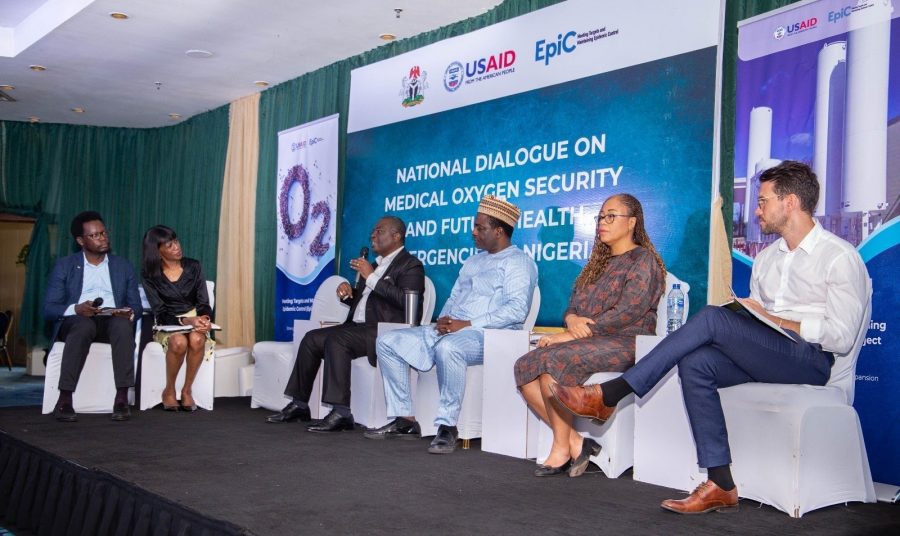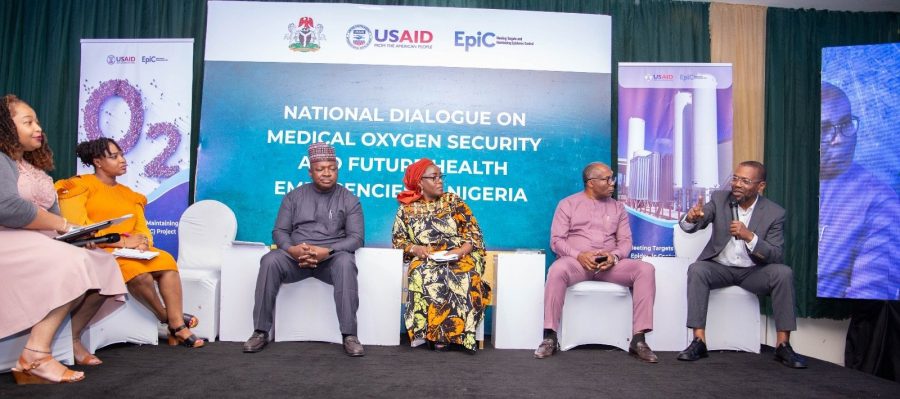In response to the critical need for ensuring medical oxygen security in the face of evolving public health challenges, the Federal Ministry of Health in collaboration with the United States Agency for International Development (USAID) funded EpiC project implemented by FHI 360 and other partners hosted a landmark National Dialogue on the November 22, 2023, with the theme ‘’National Dialogue on Medical Oxygen Security and Future Public Health Emergencies.’’ The National Dialogue identified opportunities for a more robust medical oxygen infrastructure in Nigeria, the role of the private sector in medical oxygen security and discussed strategies for sustainable financing for medical oxygen.

Medical oxygen security, including adequate access to safe, affordable, and appropriate medical oxygen services, is crucial for improving population health and meeting the Sustainable Development Goal targets. A key challenge to medical oxygen security has been persistent data gaps on oxygen needs, existing service capacity and accountability mechanisms for sustainable financing. The scarcity of comprehensive data within health facilities, logistical management systems pose a severe hindrance and impairs the capacity to plan and implement efficient solutions.Top of Form
The National Dialogue took place at Transcorp Hilton Hotel Abuja and brought together donors and multilaterals such as USAID and The World bank, Technical, experts, and policymakers to deliberate on strategies and actionable steps for enhancing medical oxygen infrastructure and preparedness for future public health emergencies. Panelists included experts from public and private sectors, as well as bilateral and multilateral donor agencies.

Key recommendations from the dialogue include the need to maximize and expand government healthcare financing for Medical Oxygen, inclusion of the private health practitioners in innovative financing and investments as well as strengthening the country’s data management system for medical oxygen to guide decision making.
Although the onset of COVID-19 pandemic exposed and exacerbated the massive underlying gap in access to medical oxygen in Nigeria, it also resulted in unprecedented attention to and investments in oxygen eco-systems, including procurement of oxygen concentrators, Pressure Swing Adsorption (PSA) plants, and liquid medical oxygen (LOX) storage systems as well as investments in healthcare worker capacity building. Thus, a major focus during the dialogue is how to operationalize the recently approved memo at the November 2023 National Council on Health (NCH), titled: MEDICAL OXYGEN INVESTMENT (PRESSURE SWING ADSORPTION PLANT, LIQUID OXYGEN TANK AND OTHER MEDICAL OXYGEN ACCESSORIES) SUSTAINABILITY. The NCH approval mandates the Federal Ministry of Health, her related Agencies and Parastatals to work with the State Ministries of Health to: “Secure a dedicated account for medical oxygen investment which shall be managed by the Federal Government of Nigeria and to also develop and implement a Standard Operational Procedure (SOP) for the management of these equipment”. This memo creates the policy environment needed to facilitate sustainability efforts.
For media inquiries, please contact:
Dr. Kenny Ewulum
Associate Director – Oxygen Programs
About FHI 360:
FHI 360 is a global organization that mobilizes research, resources and relationships so that people everywhere can access the opportunities they need to lead full, healthy lives. Our staff of over 4,000 experts work in more than 60 countries around the world, all 50 U.S. states and all U.S. territories. Our staff include experts in Health, Education, Nutrition, Environment, Economic Development, Civil Society, Gender, Youth, Research and Technology; creating a unique mix of capabilities to address today’s interrelated development challenges.
EpiC Project Description:
The Meeting Targets and Maintaining Epidemic Control (EpiC) project is a six-year initiative (April 2019-December 2025) initially designed to provide strategic technical assistance and direct service delivery to achieve control of the HIV epidemic and promote self-reliant management of national HIV programs by improving HIV case finding, prevention, treatment programming, and viral load suppression. EpiC was modified in early 2020 to include improvement of health systems’ capacity to respond to the COVID-19 pandemic. In August 2022, EpiC was modified to respond to Mpox. And in April 2023, EpiC was modified for a broad range of Global Health Security preparedness and response. EpiC is led by FHI 360 and consortium partners.
In Nigeria, EpiC has supported KP-led comprehensive HIV services in Niger and Bayelsa states and built the capacity of subaward partner UCS Global towards readiness to receive direct funding in line with PEPFAR’s goal of ensuring 70% of funding is to local partners. The EpiC project has served as a bridge following the closeout of SIDHAS and SHARP TO 1, to sustain HIV service delivery in Akwa Ibom, Cross River, Kebbi, Zamfara, Sokoto, Kwara and Niger states, and to health facilities previously supported by GF in Bayelsa, Edo and Lagos State following transition to USAID support. The bridge implementation was transitioned to the new USAID funded mechanism called Accelerating Control for HIV Epidemic Project (ACE 1-6).
With the emergence of COVID-19 pandemic in 2020, EpiC provided TA to 88 facilities that received donation of 200 ventilators including capacity building on case management/critical care, technical support for set up of emergency operation center in Bayelsa, upgrade of PCR laboratories for COVID-19 diagnosis in NIMR Lagos, UUTH Uyo, COOUTH Awka; TA for oxygen ecosystem across selected states and support for service delivery activities related to COVID-19 vaccination among persons living with HIV (PLHIV) in AKS and CRS. EpiC continued to expand new strategies to increase access to vaccines across USAID/FMOH assigned states through the Global Vaccine Access (GLOVAX) implemented in 4 states including Akwa Ibom, Anambra, Cross River and Enugu states. Additionally, the EpiC team is providing technical assistance to NACA’s GF COVID-19 Response Mechanism (C19RM) implementation in Nigeria and to expand access to liquid oxygen (LOX) infrastructure and supply across 8 tertiary facilities. Specifically, EpiC’s technical assistance contributes to objective 2 of COVID response in the Country: to reduce morbidity and mortality from COVID-19, mitigate transmission, and strengthen health systems, including to prevent, detect, and respond to pandemic threats.

